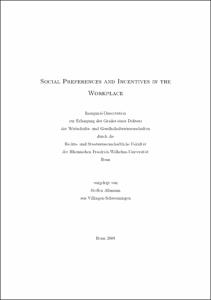Altmann, Steffen: Social Preferences and Incentives in the Workplace. - Bonn, 2009. - Dissertation, Rheinische Friedrich-Wilhelms-Universität Bonn.
Online-Ausgabe in bonndoc: https://nbn-resolving.org/urn:nbn:de:hbz:5-18467
Online-Ausgabe in bonndoc: https://nbn-resolving.org/urn:nbn:de:hbz:5-18467
@phdthesis{handle:20.500.11811/4003,
urn: https://nbn-resolving.org/urn:nbn:de:hbz:5-18467,
author = {{Steffen Altmann}},
title = {Social Preferences and Incentives in the Workplace},
school = {Rheinische Friedrich-Wilhelms-Universität Bonn},
year = 2009,
month = aug,
note = {Most economic exchanges are not based on fully contingent, explicit contracts, but rather rely on informal agreements that specify the contracting parties' obligations only imprecisely. In the labor market, contractual incompleteness is particularly widespread. Employment contracts are usually rather general agreements that specify far from all aspects of an employer-employee relationship. This dissertation aims at enhancing our understanding of behavior under contractual incompleteness, with a particular focus on workplace relationships. All chapters of the dissertation analyze situations where explicit pay-for-performance contracts are not feasible, and therefore gains from trade can only be realized if trading parties successfully make use of implicit monetary or non-monetary incentives. Chapters 1--3 concentrate on interactions that are characterized by moral hazard. It is analyzed whether and how trust and social preferences can help mitigating these problems. Chapter 1 studies the intrapersonal relationship between trust and reciprocity and explores to what extent heterogeneity in individuals' reciprocal inclination can account for commonly observed differences in trusting behavior. Chapter 2 deals with the question how horizontal fairness concerns impact the effectiveness of incentive schemes that are based on reciprocal gift exchange. Chapter 3 analyzes whether two common features of implicit contracts---gift exchange and relational contracting---can lead to involuntary unemployment. Chapter 4 studies incentives provided through promotion competitions. More precisely, it addresses the question how people behave in multi-stage elimination tournaments in comparison to simple, one-stage promotion contests. The results presented in this dissertation are directly relevant for questions studied in personnel and labor economics, but also contribute to understanding the interaction of economic incentives and social preferences, more generally.},
url = {https://hdl.handle.net/20.500.11811/4003}
}
urn: https://nbn-resolving.org/urn:nbn:de:hbz:5-18467,
author = {{Steffen Altmann}},
title = {Social Preferences and Incentives in the Workplace},
school = {Rheinische Friedrich-Wilhelms-Universität Bonn},
year = 2009,
month = aug,
note = {Most economic exchanges are not based on fully contingent, explicit contracts, but rather rely on informal agreements that specify the contracting parties' obligations only imprecisely. In the labor market, contractual incompleteness is particularly widespread. Employment contracts are usually rather general agreements that specify far from all aspects of an employer-employee relationship. This dissertation aims at enhancing our understanding of behavior under contractual incompleteness, with a particular focus on workplace relationships. All chapters of the dissertation analyze situations where explicit pay-for-performance contracts are not feasible, and therefore gains from trade can only be realized if trading parties successfully make use of implicit monetary or non-monetary incentives. Chapters 1--3 concentrate on interactions that are characterized by moral hazard. It is analyzed whether and how trust and social preferences can help mitigating these problems. Chapter 1 studies the intrapersonal relationship between trust and reciprocity and explores to what extent heterogeneity in individuals' reciprocal inclination can account for commonly observed differences in trusting behavior. Chapter 2 deals with the question how horizontal fairness concerns impact the effectiveness of incentive schemes that are based on reciprocal gift exchange. Chapter 3 analyzes whether two common features of implicit contracts---gift exchange and relational contracting---can lead to involuntary unemployment. Chapter 4 studies incentives provided through promotion competitions. More precisely, it addresses the question how people behave in multi-stage elimination tournaments in comparison to simple, one-stage promotion contests. The results presented in this dissertation are directly relevant for questions studied in personnel and labor economics, but also contribute to understanding the interaction of economic incentives and social preferences, more generally.},
url = {https://hdl.handle.net/20.500.11811/4003}
}






